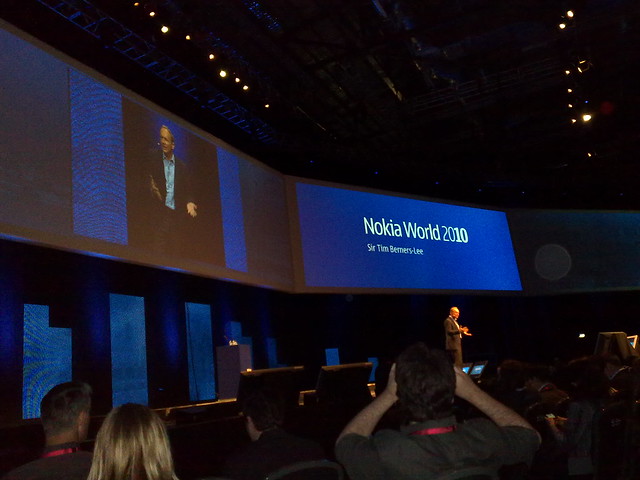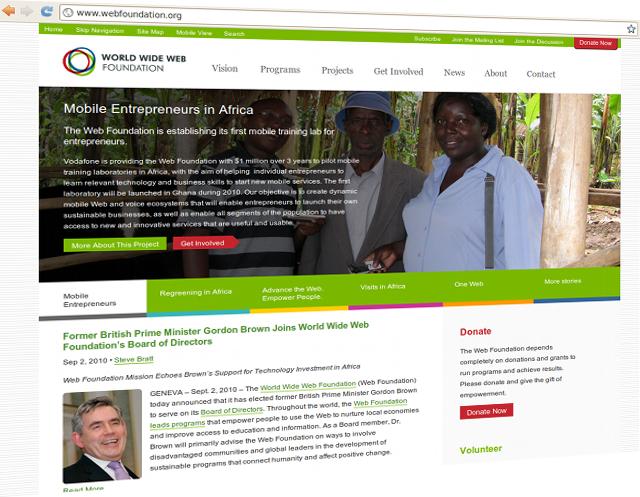
Berners-Lee encouraged use of Web applications on mobile phones. Mobile phones potentially offer an even richer web-based experience than desktop computers because of the data that they can gather about their user. Already, phones carry information about your plans (calendar), who you know (contacts), and your location. He speculated that future phones may even gather data about the mood and health of their user. All of this can be cross-referenced to provide rich and targeted information that would be of use to both users and content providers.
Berners-Lee's current interest is in getting open data online. The Web has always provided content like documents, charts, and calendars; but there has been no standardised framework in which to publish the data that went into generating them. He cited an extreme example of agencies going to the trouble of printing documents, only to then publish a scanned image of the text on-line, thus making the data almost useless without someone retyping out the entire document.
"Analysing one thing allows you to see how it is connected to other things"
When asked by Gordon Brown (former PM) about how to better conduct an open government, Berners-Lee gave the advice to publish the data behind governmental documents. As a result, data.gov.uk was created, and in parallel data.gov for U.S. government also appeared, in an apparent show of international one-up-man-ship. Beyond government however, there are many more cases to be made for publishing open data, for instance scientific data is a natural extension of this idea to aid in collaboration and transparency. A popular project in the tech community is the Open Street Map project, generating data in competition with Google and NavTeq, powered by user submitted additions and corrections.
Web applications can run on any size of device, and pull together any sets of data they like. Berners-Lee made the case that, the more Web applications there are, the bigger the increase in the social incentive to provide open and (most importantly) standardised data. As a further example of cross-referencing data, he explained how the calendar on his mobile phone is a merged display of multiple data streams. E.g. engagements, appointments and flight data. He cited the RDF information modelling language, and its SPARQL (pronounced sparkle) referencing language, as the technologies with which to consume and cross-reference open data. Yet another example he gave was cross referencing location awareness with point of information (POI) data - the result is Augmented Reality applications, such as Wikitude.
"Apps flourish on a bed of open data and standardised API's"
Berners-Lee took the audience through the three concerns he has for the future of the Web. The first was for privacy; as Web-based technology develops and the types of information we can share about ourselves grows, there is an ever increasing need to consider the privacy of individuals. The next privacy frontier we face is on location awareness, with services like Facebook Places and FourSquare, the potential for the whole world to know your every move is now realised. In fact, the Please Rob Me site was set up to highlight the risks involved with sharing one's location with the public.
We are all familiar with the general privacy issues raised by social networks. Facebook is a good example of providing privacy tools that are either obscure or incomprehensible to the average user. As such, he stressed that users need to think carefully about how their data will be used. Furthermore, he said that companies need to give users simple and straightforward control over their data, so that they can determine when and where it will be available to others. Also, extra granularity over that control needs to be included, e.g. so that a customer may disclose their postal address to an online merchant only for delivery purposes. He stated that he wants to see companies be held accountable and responsible for user data, and that systems need to be created for tracking and parsing acceptable use of personal data.
"The loss of neutrality means that we loose the essential essence of the Web"
His next concern was with that of Net Neutrality. The WC3 works at an underlying level that assumes any page is available to anyone. Issues of Net Neutrality arise when service providers have a conflict of interest. The classic example is when a phone company who also supplies Internet access could discourage customers from making free Internet calls by slowing doing VoIP traffic. I.e. intentionally making their competitors' services worse than their own unless (for example) the VoIP provider paid a fee to the Internet Service Provider to ensure their traffic would be unhindered. Another example is when governments attempt to block access to foreign websites which have conflicting political positions.
Berners-Lee reminded everyone that loss of neutrality would destroy the essential essence of the Web. He also made the economically-based argument that the loss of neutrality would hurt free enterprise. In our currently neutral World Wide Web, anyone can create new and novel technology, which can be used by anyone and promoted by word of mouth, thus allowing the best services to make a profit. With the loss of neutrality, small businesses couldn't withstand the cost of having to pay service providers so that users can access their applications.

The World Wide Web Foundation home page
Finally, Berners-Lee quoted that only 20% of the world uses the Web, and spoke about the creation of the World Wide Web Foundation, which is focused on understanding the challenges faced in enabling the remaining 80% to use the Web. There are already many foundations set up to provide the essentials, like water and vaccines, to the most poverty stricken areas of the world. While Web access may be regarded as a luxury next to those, it is all too easy to underestimate the importance disseminating information via the Web. He made an example of the AIDS epidemic; given that there is no cure, it is imperative that people are able to find out how avoid catching it in the first place; and therefore being part of the information society becomes another aid to survival.
Berners-Lee stated that in most cases lack of access to the Web was not for a lack of a signal. The World Wide Web Foundation is looking at what it costs to provide people with minimal bandwidth. Currently, mobile data packages are viewed as an 'executive class' service, but even narrow bandwidth connections can be useful, and could be made available at a low cost.
David Gilson for All About Symbian, 20th September 2010
